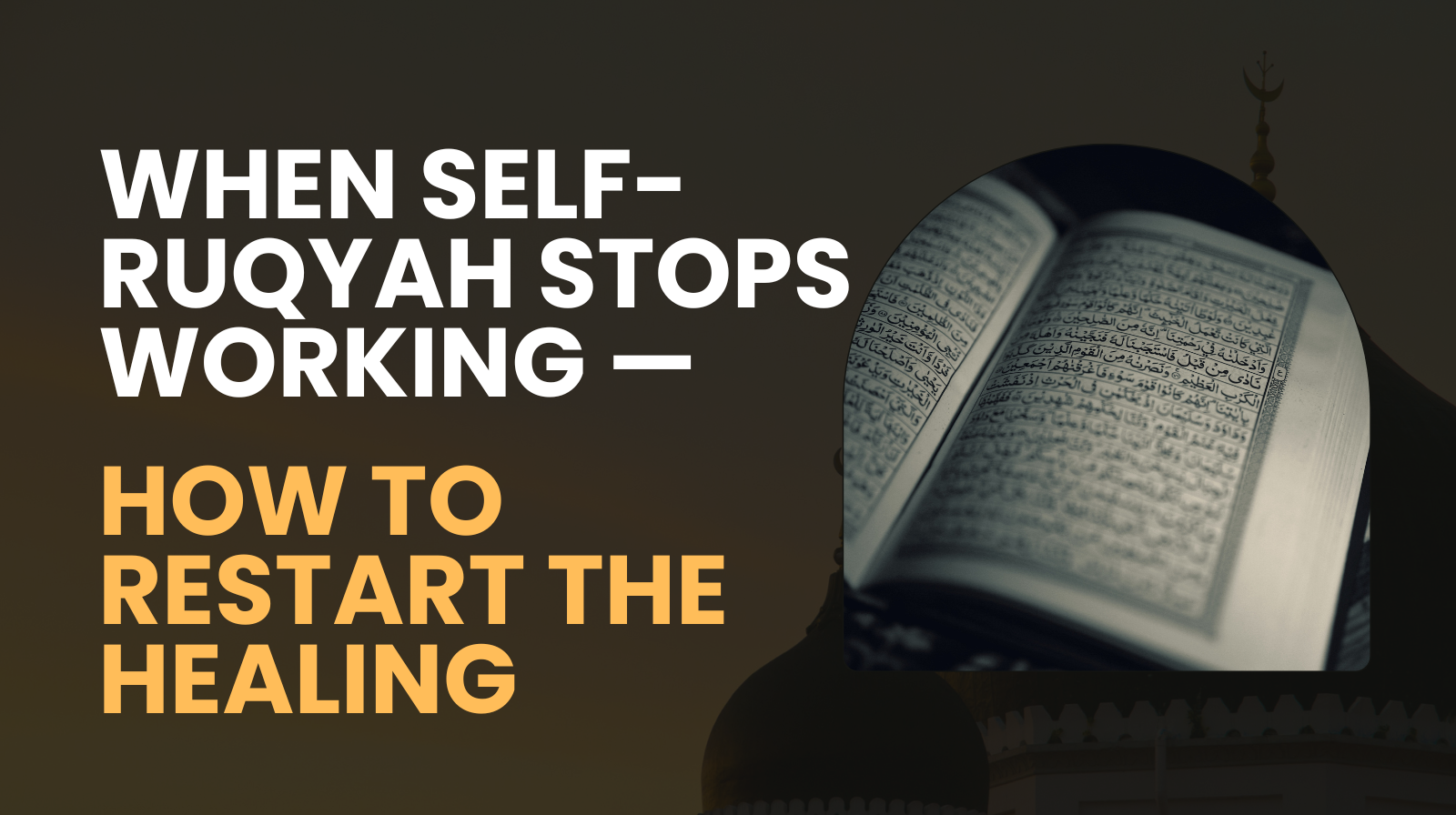When Self-Ruqyah Stops Working — and How to Restart the Healing

Many begin self-ruqyah with sincere hearts. They recite, make duʿa, and wait for relief—yet progress can feel slow or uncertain. This is not a judgment on your iman. It’s usually a sign that the healing process has layers, and a few small adjustments in sequence, routine, and review can bring the verses back to life in ways you haven’t felt before.
Ruqyah Healing Insight
The Qur’an heals with hikmah and tartīb (wisdom and order). When we recite with structure—diagnosis → plan → re-diagnosis—the same verses begin to act like precise medicine.
Why Progress Sometimes Pauses?
1) We’re reciting without a map
It’s common to recite “everything for everything.” But most cases respond better when we
clear layers in order: Ayn → Hasad → Sihr → Jinn (while also supporting mood and thought patterns).
2) Big efforts, fragile routines
Two intense days, then gaps. The heart is willing; the system is tiring. Small, repeatable routines (10–15 minutes) outperform rare marathons.
3) Treating later layers first
Jumping straight to “jinn” while Ayn/Hasad signs persist can stall momentum. Like removing locks one by one, order matters.
4) No “scoreboard” to notice change
If we don’t
re-diagnose, subtle improvements go unnoticed—and hope dips. Gentle, periodic checks prevent despair and guide the next step.
5) Emotional overload
Fear spirals, debates, doom-scrolling—these drain resolve. Pairing ruqyah with calming anchors (adhkār rhythm, short walks, Qur’an before phone) steadies the heart.
A Sunnah-Aligned Way to Restart Momentum
Phase A (Days 1–7):
Recite with the
intention of receiving shifāʾ from Ayn and Hasad alone.
Recite
Ayatul Kursi (2:255),
Surah Al-Ikhlas,
Al-Falaq,
and
An-Nas, or
any surah or verses that bring tranquility—even short portions of Surah Al-Imran (1–9).
Focus calmly on Ayn/Hasad indicators. Keep a short, same-time routine. Note any lightening of heaviness, improved sleep, or fewer intrusive thoughts.
Re-diagnose (Day 7):
If reactions lessen, continue for a few more days.
If signs remain, it may be time to seek help from a
qualified Raaqi
who can guide you through the next phase with precision and safety.
🩺 Book a free consultation to diagnose your case: https://www.ruqyahealing.co/bookfreeconsultation
Phase B (Days 8–14):
Recite with the
intention of destroying Sihr (black magic)
through the words of Allah. Use
Ayatul Kursi,
the first ten verses of Surah As-Saffat, or
Surah Al-Aʿraf 117-122 / Yunus 81-82 / Taha 68-70,
which are most commonly used for Sihr.
Do not stress yourself—recite only what you can handle calmly and
do not tire yourself.
Maintain consistency, stay hydrated, and keep your heart at ease.
Re-diagnose (Day 14):
If improvement continues, complete your 14-day cycle. If signs persist, guided help is again beneficial—Sihr often requires
precise methods and follow-up
rather than intensity.
🩺Book a free consultation to diagnose your case: https://www.ruqyahealing.co/bookfreeconsultation
Phase C (Beyond Day 14):
When signs of
Jinn Affliction
are present, recite with the
intention of seeking shifāʾ from Allah to remove the jinn from afflicting you.
You may recite
Ayatul Kursi,
Surah Al-Baqarah 1-5 & 255,
Al-Saffat,
or other ruqyah verses you know. Do not pressurize yourself or tire your body—the jinn anchor themselves to those burdened with
stress, fear, or anger.
Stay composed, breathe steadily, and recite with calm focus and full trust in Allah.
If the reactions become strong or exhausting, stop, rest, and reach out to a
trained Raaqi
for structured support.
Remember: The healing comes from Allah alone with the recitation of the Qur'an done in order, calmness, and reliance—not through exhaustion or confrontation. Every recitation is a step closer to ease, even if unseen.
👉 Continue Your Healing Journey
If this article resonated with you, continue reading the next part in our Self-Ruqyah Series:
Self-Ruqyah vs Guided Ruqyah — When to Switch
Discover when seeking help from a trained Raaqi becomes the wiser step — and how guided Ruqyah adds structure, safety, and faster progress.
You can also explore:
- 📖
Free Book Download – Self-Ruqyah: Sunnah or Shortcut?
Learn the deeper wisdom behind structured Ruqyah from the Qur’an and Sunnah. - 💬
Real Stories of Healing
Watch testimonies of people who regained peace and clarity after years of struggle. - 🕋
Book Your Diagnosis Session
Get a personalized assessment and start your guided healing journey today.
🌿 Final Reflection
Every ayah you recite is heard by the One who Heals.
Even slow progress is still progress — because healing isn’t about speed, it’s about surrender.
“And when I am ill, it is He who cures me.”
— Surah Ash-Shu‘ara (26:80)
